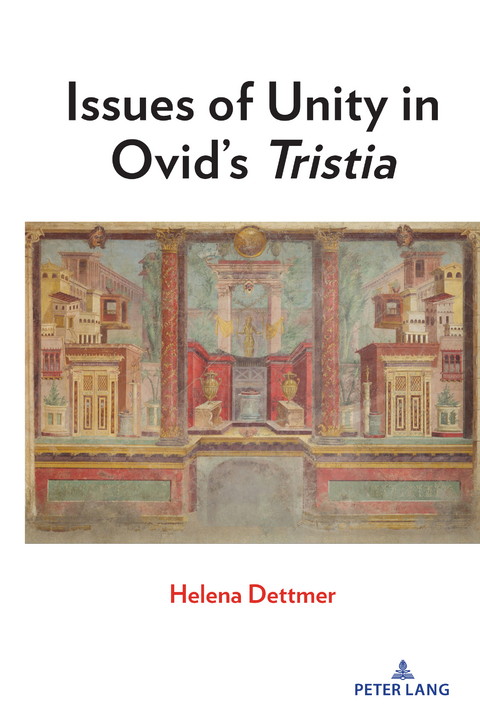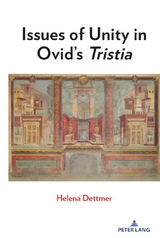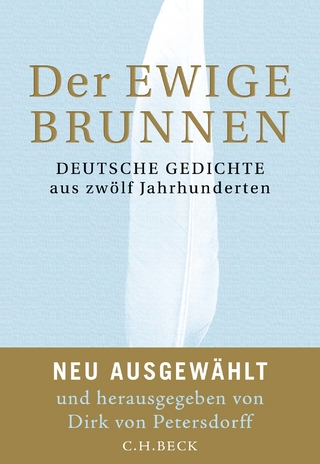Issues of Unity in Ovid’s Tristia"
Seiten
2021
|
New edition
Peter Lang Publishing Inc (Verlag)
978-1-4331-7742-2 (ISBN)
Peter Lang Publishing Inc (Verlag)
978-1-4331-7742-2 (ISBN)
The aim of this study is to show that definitive evidence can be offered to justify division of these six elegies into two poems. Structure combined with theme serves as an analytical tool that defines the beginning and end of the twelve literary pieces under consideration and highlights their artistry.
In his 1995 Teubner edition, J. B. Hall separates Tristia 1.5, 1.9, 3.4, 4.4, 5.2, and 5.7 into two poems. One reviewer of Hall’s edition is highly critical of the editor for not justifying the separation of these poems despite the fact the divisions have manuscript support. Because of the sorry state of the textual transmission of Ovid's Tristia, it is sometimes difficult to determine the beginning and end of an individual poem if that poem resumes thematically and verbally where the previous poem concludes. The aim of this study is to show that definitive evidence can be offered to justify division of these six elegies into two poems. Structure combined with theme serves as an analytical tool that defines the beginning and end of the twelve literary pieces under consideration and highlights their artistry. Resolution of the issue of unity enhances our interpretation of the independent poems and our understanding of the complex interplay among poems within each poetry-book. The careful and often brilliant craftsmanship of the poems and of the books in which they appear reaffirms that Ovid’s repeated deprecation of the quality of his literary work composed during his period of exile in the Black Sea region is simply a pose to attract sympathy and support from his Roman audience.
In his 1995 Teubner edition, J. B. Hall separates Tristia 1.5, 1.9, 3.4, 4.4, 5.2, and 5.7 into two poems. One reviewer of Hall’s edition is highly critical of the editor for not justifying the separation of these poems despite the fact the divisions have manuscript support. Because of the sorry state of the textual transmission of Ovid's Tristia, it is sometimes difficult to determine the beginning and end of an individual poem if that poem resumes thematically and verbally where the previous poem concludes. The aim of this study is to show that definitive evidence can be offered to justify division of these six elegies into two poems. Structure combined with theme serves as an analytical tool that defines the beginning and end of the twelve literary pieces under consideration and highlights their artistry. Resolution of the issue of unity enhances our interpretation of the independent poems and our understanding of the complex interplay among poems within each poetry-book. The careful and often brilliant craftsmanship of the poems and of the books in which they appear reaffirms that Ovid’s repeated deprecation of the quality of his literary work composed during his period of exile in the Black Sea region is simply a pose to attract sympathy and support from his Roman audience.
Helena Dettmer received her PhD from the University of Michigan. She serves as Professor of Classics at the University of Iowa. Her previous publications include: Horace: A Study in Structure and Love by the Numbers: Form and Meaning in the Poetry of Catullus.
Introduction – Tristia 1.5 and 1.9 – Tristia 3.4 – Tristia 4.4 – Tristia 5.2 and 5.7 – Conclusion – Appendix A: Catullus 8 – Appendix B: Text and Translation – General Index.
| Erscheinungsdatum | 15.01.2021 |
|---|---|
| Zusatzinfo | 37 Illustrations, unspecified |
| Verlagsort | New York |
| Sprache | englisch |
| Maße | 150 x 225 mm |
| Gewicht | 368 g |
| Themenwelt | Literatur ► Lyrik / Dramatik ► Lyrik / Gedichte |
| Geisteswissenschaften ► Geschichte | |
| ISBN-10 | 1-4331-7742-0 / 1433177420 |
| ISBN-13 | 978-1-4331-7742-2 / 9781433177422 |
| Zustand | Neuware |
| Informationen gemäß Produktsicherheitsverordnung (GPSR) | |
| Haben Sie eine Frage zum Produkt? |
Mehr entdecken
aus dem Bereich
aus dem Bereich
Deutsche Gedichte aus zwölf Jahrhunderten
Buch | Hardcover (2023)
C.H.Beck (Verlag)
28,00 €
Text, Übersetzung, Melodien, Kommentar
Buch | Softcover (2024)
De Gruyter (Verlag)
24,95 €




